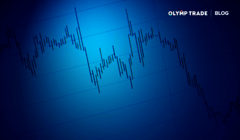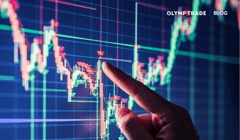
Stock prices are influenced by various factors, but the most influential one is supply and demand. If investors are interested in a company, they buy its shares and the share price goes up as a result. Because the total number of a company’s shares is limited, the price will go up when the shares are in high demand. As a result, you can end up paying more for the same shares if you don’t go for them at the current price, because someone will buy them if you don’t, thus driving the price upwards.
The opposite case of this is also true. If investors suddenly want to sell their shares in a company, this can flood the market, and with little demand going, the prices of the shares will fall. In this article, you’ll learn in detail about what factors affect stock prices.
Contents:
- What is a stock price?
- Calculating the value of a company by its share price
- What affects stock price?
- Stock price vs. stock value
- Conclusion
Interact with the underlined words and green dots to get additional details and explanations.
Additional context for the visuals.
Explanations and definitions of terms.
What is a stock price?
A stock price is the most recently traded share price of a stock that is trading on the stock market. When a company goes public and issues shares, a price is assigned to each share of that stock, which is known as the share price of that particular company or stock.
These share prices are used to calculate the market value of a company and whether it is overvalued or undervalued. These share prices are affected by major factors, such as geopolitical events, climate issues, the global economic situation, industrial output and more. In a nutshell, a stock price is the value that investors are ready to pay to buy a piece of that company.
Read more: Shares vs. stocks: Are they the same or different?
Calculating the value of a company by its share price
The formula for calculating the value of a company by share price is fairly simple:
Market capitalization = share price × number of shares
Firstly, the company’s market capitalization, or market value, is determined by its management and appointed auditing firm in a complex process using different valuation methods and formulas. After the value has been determined, it is divided among a set number of shares, which are then issued in the market. This is known as an Initial Public Offering (IPO), during which a private company becomes a public corporation by offering its shares in the stock market. Each share represents a tiny stake in the company, so if we multiply the price of one share with the total number of shares, we get the market capitalization or the cost of the company.
For example, if a company worth $1 billion issues 10 million shares, then the price of each share will be $100. If you have one share of this company, you are the owner of 1/10 million of this company.
What affects stock price?
When a company’s stock is traded in the public market, its price can be affected by various factors. Let’s discuss them one by one:
Supply and demand 📈
Because the number of shares are fixed, that means the supply of the shares are fixed. If more and more investors are interested in the company, the price of its shares increases.
News 📰
Sudden bad news about a company will have a negative impact on its stock price. Positive news can have just as much of an influence; if there is sudden positive news about a company, its prices go up.
Earnings 📊
A company that is generating regular profit and whose profitability is constantly increasing will attract more investors, thus driving up the company’s share price.
Management-related news 👨💼️
Dividend announcements, changes in the board of directors, annual general meetings and other management-related news all affect the market price of a company’s shares.
Politics and geopolitics 🌍
If there is a war or uncertainty in the stability of a government, it affects the entire stock market.
The climate and environment 🌱
The state of the Earth and projections for its wellbeing also impact stock prices, as unruly weather conditions can create disruptions in the supply chain, while negative climate projections bring certain industries into question, scrutiny or popularity.
The economy 🏦
Inflation, the labor market and other economical factors also affect stock prices.
Trader sentiment 👨💻️
Fear and greed in the market affect stock prices. When traders are highly optimistic about a stock or worried about missing their chance to purchase it before it becomes even more expensive (FOMO), they’ll buy it at any price, which drives the stock’s price to extremely high levels.
Read more: A guide to trading psychology
Stock price vs. stock value
Most people confuse stock price with stock value, but that is not to say that stock price is equal to stock value. A stock price’s absolute value doesn’t reveal anything about the valuation of the company. If there is a stock worth $10 per share, it doesn’t mean that the company has a low valuation. Likewise, if there is a stock worth $10,000 per share, it does not mean the company has a high valuation.
Cheap stocks are known as penny stocks and are in fact riskier because the prices are low and have not grown due to the company’s poor performance. Very often, those penny stocks generally go to $0 per share.
To value a stock correctly, we have to calculate the company’s earnings per share and price-to-earnings ratio. Earnings per share is calculated from the company’s total net income divided by its total number of shares. This shows how much the company is earning on each of its shares.
This leads us to the price-to-earnings ratio. The P/E ratio is calculated from the company’s share price divided by its earnings per share. In short, when a company’s P/E is low compared to the industry, its stock is considered cheaper and undervalued. Conversely, when a company’s P/E is high, its stock is considered overvalued. For example, the P/E ratio of Netflix is 20 compared to the IT industry’s P/E of 56. This means Netflix is cheaper and undervalued compared to the industry.
Share Price / Earnings per Share = P/E Ratio
Conclusion
Stock prices are calculated via different methods, and should not be confused with stock value or company value. It is important to first know the P/E ratio and market capitalization of a stock in order to understand its price. There are many factors influencing stock prices and driving volatility, so it’s crucial to analyze the fundamentals of a company before investing in it.
Join Olymp Trade and take advantage of our wide range of tools and feature-rich trading platform. Boost your trading skills, implement strategies and enjoy trading with a broker that wants to see you succeed.
Go to Olymp TradeRisk warning: The contents of this article do not constitute investment advice, and you bear sole responsibility for your trading activity and/or trading results.
Fear of missing out.











